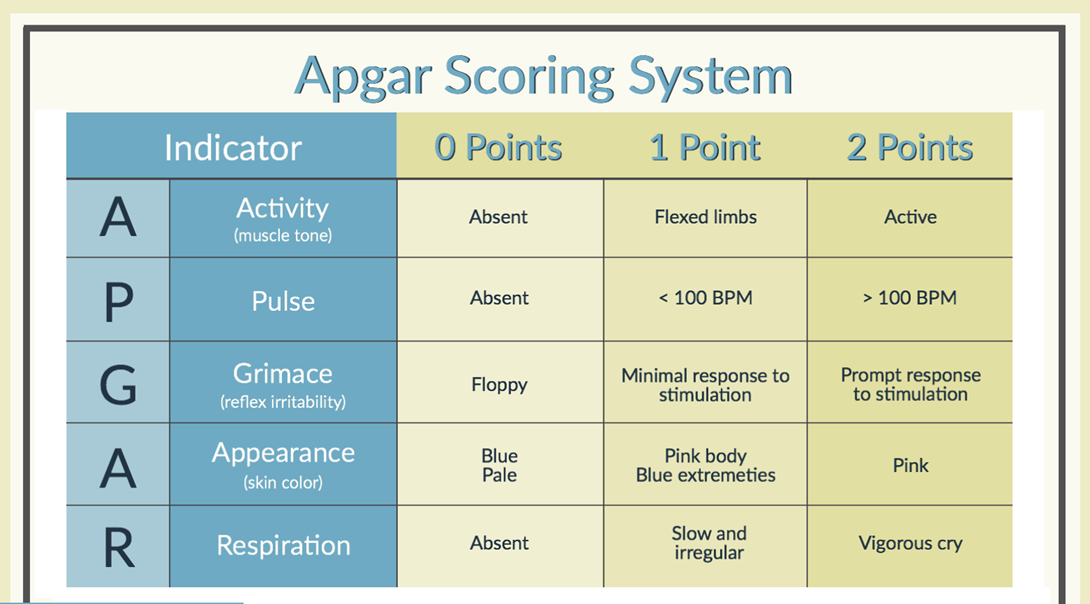The nurse will conduct what assessment on a newborn at 1 minute and 5 minutes after birth?
Apgar score
Blood pressure reading
Head and chest circumference
Respiratory and abdominal assessment
The Correct Answer is A
Choice A reason: This is the best answer. Apgar score is a quick and simple assessment that evaluates the newborn's appearance, pulse, grimace, activity, and respiration. It is done at 1 minute and 5 minutes after birth, and sometimes at 10 minutes if needed. It helps to determine the newborn's condition and need for resuscitation or medical intervention.
Choice B reason: This is not the correct answer. Blood pressure reading is a measurement of the force of the blood against the walls of the arteries. It is not routinely done on newborns, unless there is a suspicion of a cardiac or renal problem. It is usually done after the first 24 hours of life, and then as indicated by the newborn's condition.
Choice C reason: This is not the correct answer. Head and chest circumference are measurements of the size and shape of the newborn's head and chest. They are done once within the first 24 hours of life, and then as indicated by the newborn's condition. They help to monitor the newborn's growth and development, and to detect any abnormalities or asymmetries.
Choice D reason: This is not the correct answer. Respiratory and abdominal assessment are examinations of the newborn's breathing and digestion. They are done once within the first 24 hours of life, and then as indicated by the newborn's condition. They help to evaluate the newborn's lung and bowel function, and to identify any signs of distress or complications.

Nursing Test Bank
Naxlex Comprehensive Predictor Exams
Related Questions
Correct Answer is D
Explanation
Choice A reason: This is not the correct stage. Trust vs mistrust is the first psychosocial stage, which occurs from birth to 18 months. The main task of this stage is to develop a sense of trust in the caregivers and the environment.
Choice B reason: This is not the correct stage. Autonomy vs shame and doubt is the second psychosocial stage, which occurs from 18 months to 3 years. The main task of this stage is to develop a sense of independence and self-control.
Choice C reason: This is not the correct stage. Initiative vs guilt is the third psychosocial stage, which occurs from 3 to 6 years. The main task of this stage is to develop a sense of initiative and creativity.
Choice D reason: This is the best answer. Industry vs inferiority is the fourth psychosocial stage, which occurs from 6 to 12 years. The main task of this stage is to develop a sense of competence and achievement in social and school activities.
Correct Answer is ["A","B","C","D"]
Explanation
Choice A reason: This is a correct answer. Second-hand smoke is the smoke that is exhaled by a smoker or emitted by a burning cigarette, cigar, or pipe. It contains many harmful chemicals that can cross the placenta and affect the developing fetus. Second-hand smoke can increase the risk of low birth weight, preterm birth, congenital anomalies, and sudden infant death syndrome (SIDS) .
Choice B reason: This is a correct answer. Drugs including alcohol are substances that can alter the mood, perception, or behavior of the user. They can also cross the placenta and affect the developing fetus. Drugs including alcohol can cause fetal alcohol spectrum disorders (FASDs), neonatal abstinence syndrome (NAS), growth restriction, brain damage, and birth defects .
Choice C reason: This is a correct answer. Infections are diseases that are caused by microorganisms, such as bacteria, viruses, fungi, or parasites. They can also cross the placenta and affect the developing fetus. Infections can cause miscarriage, stillbirth, preterm labor, congenital infections, and congenital anomalies .
Choice D reason: This is a correct answer. Metabolic conditions are disorders that affect the body's ability to produce or use energy, such as diabetes, thyroid disease, or phenylketonuria (PKU). They can also cross the placenta and affect the developing fetus. Metabolic conditions can cause macrosomia, hypoglycemia, congenital hypothyroidism, or intellectual disability .
Choice E reason: This is not a correct answer. Processed foods are foods that have been altered from their natural state, such as canned, frozen, or packaged foods. They may contain additives, preservatives, or artificial flavors or colors. They do not cross the placenta and affect the developing fetus directly, but they may affect the mother's nutrition and health. Processed foods may increase the risk of obesity, hypertension, or gestational diabetes, which can indirectly affect the fetal development .
Whether you are a student looking to ace your exams or a practicing nurse seeking to enhance your expertise , our nursing education contents will empower you with the confidence and competence to make a difference in the lives of patients and become a respected leader in the healthcare field.
Visit Naxlex, invest in your future and unlock endless possibilities with our unparalleled nursing education contents today
Report Wrong Answer on the Current Question
Do you disagree with the answer? If yes, what is your expected answer? Explain.
Kindly be descriptive with the issue you are facing.
